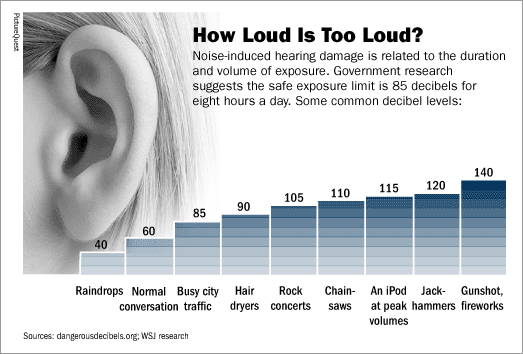The Sounds of Summer: Is Your Hearing at Risk?
Ah, the sounds of summer: parades, concerts in the park, power lawn tools, sporting events, target practice, firework displays, four-wheelers. We all want summer to last, but not because of a lifelong reminder like hearing loss.
The fact is, sounds we associate with summer can cause permanent, irreversible ear damage. Thanks to federal Occupational Safety and Health Administration requirements, employees who work in noisy environments and around noisy equipment tend to wear ear protection. But they aren’t the only ones who should take precautions.
Noise-induced hearing loss (NIHL) affects about 10 million people in the U.S. — a staggering number considering NIHL is completely preventable. Delicate hair cells in our inner ears that help transmit vibrations into sound can be damaged any time we’re exposed to loud noises. Once the hair cells are damaged, they cannot be replaced. Using proper ear protection such as earplugs or earmuffs can shield the cells from loud noise.
How Loud is Too Loud?
Permanent hearing loss can occur when we are exposed to sounds that are 85 decibels or higher. To put that in perspective, a normal conversation is around 60 decibels. If you find yourself having to raise your voice to be heard over the surrounding noise, it is too loud and nearing dangerous levels. The chart below gives approximate decibel levels to common situations. Extremely high decibel levels can cause instant hearing loss and should be avoided.
Proper Ear Protection
The quickest and easiest way to protect your ears from noisy situations is to eliminate the noise source when possible, or move away from the noise. As you move farther away from the sound source, the decibel level weakens. So moving away from a noisy situation until you can easily hear a normal conversation will take your ears out of harm’s way. You can read more about the relationship between sound and distance at Understanding Decibels.
In situations where loud noise cannot be avoided, wear protective earplugs or earmuffs. They are available at most hardware and sporting goods stores. In a pinch, cotton balls are better than nothing.
Any prolonged exposure to 85 decibels or more can result in loss of hearing. Mowing the grass, motor boating and concerts are all situations where ear protection should be worn. And don’t forget the kids! Make sure small children wear earmuffs at parades and festivals. Once they are old enough, teach them how to use earplugs properly.
Hearing loss can be accompanied by tinnitus – ringing or humming in the ears. If you experience tinnitus, trouble understanding speech, or hearing certain sounds or pitches, consult with an ENT (ear, nose and throat) doctor.
For more information on NIHL visit the National Institute on Deafness and Other Communication Disorders.
Dr. Jeff Pinkerton
I care for you.

